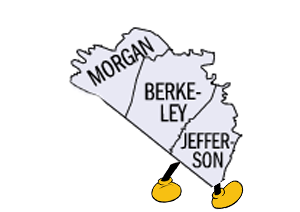
Map: US Census Bureau
First Tunisia, then Egypt, now…West Virginia? Well, no, not exactly. But delegate Larry Kump has had it up to here with his state’s government. “I take pride in being a Mountaineer,” says the freshman legislator—but he’d rather break his beloved state apart than see it suffer on as an economic backwater.
“Our per capita income in West Virginia is 47th in the United States; it’s one of the few things we’re not 50th in,” Kump says. “We’ve lost 10,000 manufacturing jobs over the past three years. Gross Domestic Product is 49th in the nation.”
He adds, “I’d prefer West Virginians stay together and just get their act together—but if they don’t, I think it’s a good idea to go elsewhere.”
Elsewhere, in this case, means moving back in with the ex. Last week, Kump, a self-identified “libertarian grassroots populist” with tea party ties, introduced a bill in the state legislature calling for a non-binding referendum on secession. Specifically, Kump suggests that the three counties of the state’s eastern panhandle break away from the mother ship and become a part of Virginia (as they were prior to 1863). His reason is simple: Kump believes the state government has created an economic climate that’s holding its citizens back. West Virginia’s almost heaven, in other words, but it’s an awful big “almost.”
“One of my favorite sayings here in West Virginia is ‘Thank God for Mississippi,’* because if it wasn’t for Mississippi, we’d be fiftieth in everything,” says Kump (who clearly hasn’t seen this map). “All you need to do is cross the border in any of the surrounding states and they’re all doing much better than we are.”
Kump’s hardly the first person to contemplate leaving West Virginia, but his grievances are noteworthy in part because of what inspired him: Unleashing Capitalism, a 2007 pro-business manifesto edited by West Virginia University economist Russell Sobel. The book, supported by funding from the energy conglomerate Koch Industries, has become a must-read for the state’s reform-minded conservatives, who tout it as a blueprint for economic growth. The state’s GOP chairman called the book “our party platform” when it was first released; it’s spawned a sequel (about South Carolina), and been honored by the Atlas Economic Research Foundation, a Washington-based think tank backed by Exxon-Mobil.
“A lot of people want to blame West Virginia’s poverty on things like our climate or our geography or our weather,” says Sobel. “The argument in the book is that our policies aren’t as good as the states around us.”
To wit, Kump (and the book) take dead aim at his state’s regulatory structure and tax code, decrying West Virginia’s tax on business inventory, for instance, as well as a sales tax on groceries. Among other things, Unleashing Capitalism makes the argument for the abolition of the state’s minimum wage law and the easing of mine safety regulations.
But some of Kump’s complaints could have broader support. For instance, he cites a report from Americans for Tort Reform, which calls the state a “judicial hellhole.” Frivolous lawsuits might not be the job-killers business groups make them out to be, but Kump’s call for an end to the election of judges isn’t without merit. Judicial elections in West Virginia have helped corporations stock the bench with friendly jurists—just take it from John Grisham.
If nothing else, Kump has geography on his side. Sobel, who did not advocate secession in the book or consult with Kump about the bill, explains: “The eastern panhandle of West Virginia competes in the DC labor market. It’s so different than the rest of the state.”
That poor place—I feel bad for them,” he continues. “They definitely deserve to be a part of one of those other states, you know? I think it’s really funny that he’s doing that.”
Still, hatching a plan to detach your legislative district from the rest of the state is usually the kind of thing you’d want to run by residents first. Kump, who took office three weeks ago, concedes his constituents seemed “taken aback” at first. As one woman told the Charleston Daily Mail, “What would we do? Return to England?” People are starting to come around, Kump says. But his colleagues in the capital? Not so much.
“Quite frankly, I’d be surprised if we even get a committee hearing,” Kump concedes. “But if we do, I’ll go in with both guns blazing.”
*This is not, apparently, just a West Virginia thing. Arkansans do it too—so much so that Gov. Mike Beebe recently had to tell his constituents to knock it off.
















